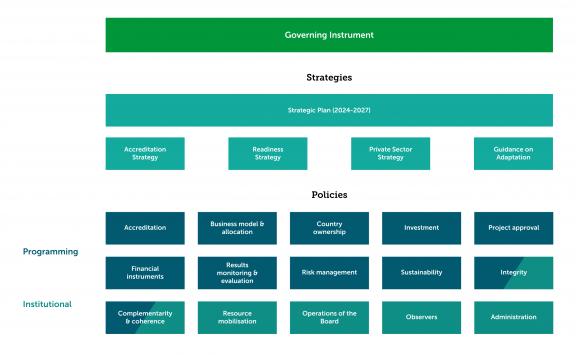Policies & strategies
Policies and strategies
As part of its mandate, the GCF Board approves specific operational policies and guidelines, including for programming, project cycle, administration, and financial management. The Board also approves strategies, which guide the overall direction of Fund operations. Together, these strategies and policies establish the framework for implementation of the GCF’s Governing Instrument.
The main GCF policy frameworks, aligned with the Governing Instrument and strategies, are shown in the diagram below.

Governing Instrument
The Governing Instrument for the Green Climate Fund was approved by the Conference of the Parties to the United Nations Framework Convention on Climate Change (UNFCCC) at its seventeenth session on 11 December 2011 in Durban, South Africa.
Strategic plan & other strategies
In advance of the second Replenishment period the Board updated its Strategic Plan for 2024-2027 at B.36, setting out the major programming directions and operational and institutional priorities for GCF-2. GCF’s initial Strategic Plan was adopted in 2016 for the Initial Resource Mobilization period (2015-2019) and was then updated in 2020 for the GCF first replenishment period (2020-2023).
Private sector strategy
The Board adopted at B.32 the Private Sector Strategy, which sets out the four pillars through which the GCF aims to catalyze private climate finance in a country-driven manner to meet developing countries’ needs and the objectives of the Updated Strategic Plan.
Guidance on adaptation
The Board welcomed at B.33 the Guidance on adaptation which speaks to the GCF’s vision, strategic approach, and scope for supporting adaptation programming, and how the GCF aims to deliver this through its range of modalities that support adaptation activities.
Accreditation strategy
The Board adopted at B.34 the Accreditation Strategy, which clarifies the GCF operating model and guides the evolution of the GCF network of AEs in order to deliver on the GCF’s mandate, objectives and programming directions.
Readiness strategy 2024-2027
The Board adopted at B.37 the Readiness Strategy 2024-2027, which presents the revised strategy for the Readiness Programme that continues to serve as a critical instrument in fulfilling the GCF’s strategic vision and ambition.
Policies
GCF policy frameworks generally include a mix of top-level policies adopted by the Board to govern a specific subject matter, the related Board decisions which adopt the policies and may contain additional policy provisions, and other policy instruments (such as standards or guidelines) which further elaborate how policies should be operationalized.
Clicking on the boxes will take you to the policies in each framework. Alternately, you can search across the entire suite of policies through the search function below.
Search policies & strategies
| Title | Theme | Date |
|---|---|---|
|
Updated terms of reference of the Independent Evaluation Unit Adopted by decision B.BM-2021/15. Adopts the updated terms of reference of the Independent Evaluation Unit. |
Terms of reference | 25 Jun 2021 |
|
Administrative remedies and exclusion policy Adopted by decision B.BM-2021/09. Sets out the administrative process by which the Fund determines, through administrative proceedings or settlements, whether or not to apply administrative remedies and exclusions against counterparties found to have engaged in prohibited practices in connection with Fund-related activities. |
Integrity | 12 May 2021 |
|
Revised policy on the prevention and protection from Sexual Exploitation, Sexual Abuse, and Sexual Harassment Adopted by decision B.BM-2021/08. This policy sets out the obligations for GCF Covered Individuals to prevent and respond to SEAH and to refrain from condoning, encouraging, participating in, or engaging in SEAH. |
Integrity | 11 May 2021 |
|
Evaluation policy for the GCF Adopted by decision B.BM-2021/07. Sets out the evaluation policy to assess the results, performance, efficiency and effectiveness of the GCF in delivering its mandate. |
Results, monitoring & evaluation | 04 May 2021 |
|
Updated independent Technical Advisory Panel review procedure Adopted by decision B.28/03. Establishes an updated independent Technical Advisoy Panel review procedure. |
Project approval | 19 Mar 2021 |
|
Investment framework for GCF-1 |
Investment | 13 Nov 2020 |
|
Updated Strategic Plan for the Green Climate Fund 2020-2023 Adopted by decision B.27/06. Sets out the funding allocation parameters and guidelines from B.27 onwards for the GCF-1 period. |
Business model & allocation | 13 Nov 2020 |
|
Gender policy Adopted by decision B.24/12. Sets out the updated gender policy and gender action plan across its investment criteria, and as an integrated measure of the social dividends of the overall portfolio. |
Sustainability | 14 Nov 2019 |
|
Policy for contributions to the Green Climate Fund for the first replenishment Adopted by decision B.24/02 (f); applicable to GCF-1. Defines the resource mobilization approach for the first replenishment period including the sources of funds, types of contributions, conditions, commitment authority, and risk mitigation measures. |
Resource mobilisation | 14 Nov 2019 |
|
Gender action plan Adopted by decision B.24/12. The purpose of the gender action plan is to provide a time-bound framework within which to operationalize the gender policy. |
Sustainability | 14 Nov 2019 |